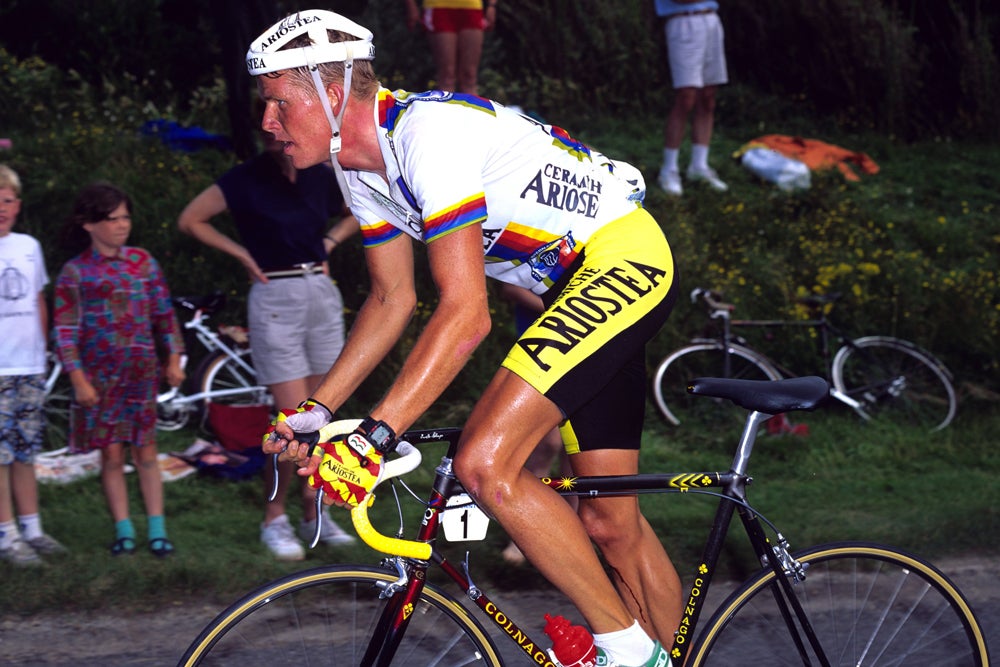Rolf Sorensen admits to doping during his cycling career

Rolf Sorensen won two Tour de France stages, one Giro d'Italia stage, several one-day classics and an Olympic silver medal during his career. Photo: Graham Watson | <a id="www.grahamwatson.com" href="http://grahamwatson.com">www.grahamwatson.com</a>
MILAN (VN) — Dane Rolf Sorensen admitted Monday night to doping his way through a career that included wins in the Tour de France, Ronde Van Vlaanderen (Tour of Flanders), and Liège-Bastogne-Liège. His is the latest in several big admissions following the Lance Armstrong scandal last summer.
“I’ve decided to clarify, as most have insinuated for a long time, that I doped. I used EPO and sometimes cortisone,” Sorensen said in a statement, according to Denmark’s TV 2. “It’s long overdue, but I too must admit that I was apart of the EPO-era that was part of the sport in the 90s. There is no other excuse than that I did what I felt I had to do to be competitive with my rivals.
The 47-year-old raced from 1986-2002. He won a silver medal in the 1996 Atlanta Olympics, two stages at the Tour de France, one stage at the Giro d’Italia, and several one-day classics, including Ronde and Liège.
He joins a list of Danes — Bjarne Riis, Jesper Skibby, Brian Holm, and Bo Hamburger — who have already confessed to doping in their careers.
Armstrong scandal
The Lance Armstrong scandal and subsequent Reasoned Decision by the US Anti-Doping Agency (USADA) last year increased the pressure on riders from the “EPO-era.”
In The Netherlands, pressure mounted. Due to several other cases and Levi Leipheimer’s admission, long-running Dutch sponsor Rabobank pulled the plug on its sponsorship. The team continues as Blanco this year, but is searching for a sponsor.
Sorensen raced with Rabobank from 1996 to 2000. He is the ninth Rabobank rider to admit to doping since the Armstrong scandal. Over the last several weeks, Michael Rasmussen and Michael Boogerd also confessed.
Junkies
As part of the USADA case, Sky’s Michael Barry admitted he doped during his years with Armstrong. After the Reasoned Decision was published, Sky asked its staff and riders to re-pledge allegiance to its zero-tolerance stance.
Race coach Bobby Julich and sports director Steven De Jongh admitted they doped in their careers and quit Sky. Sean Yates, Armstrong’s former teammate and director, also quit, but cited health problems.
Sky team principal David Brailsford likened doped cyclists to junkies.
“To me [the riders who doped] are not bad people as such,” Brailsford said at a conference in London yesterday, according to The Guardian. “It is similar to someone having their first joint and then moving onto ecstasy or whatever. Then the next thing you know it is everyone on crack cocaine.”
Julich has yet to join a new team. De Jongh is now directing with Bjarne Riis’ Saxo-Tinkoff squad.
Working ahead
Sorensen worked as a commentator for TV 2 in races such as the Tour de France. He will keep his job.
“I support Rolf Sorensen. He is still cycling commentator on TV2 Sport,” the station’s sports director Frederik Lauesen told the Ritzau news agency.
Sorensen regrets not coming clean earlier.
“Over the past year, I’ve been asked several times about the issue and I should’ve just come clean a long time ago,” he said. “It’s not happened that way, that’s solely my responsibility and I sincerely apologize with great humility for my tardiness.
“The apology is especially directed to all the good people who, on an erroneous basis, tried to defend me. My admission comes too late. Too late.”